#media influences
Text
How much power does the media REALLY have over us? ILL EFFECTS is a new podcast investigating the bad-faith arguments, dodgy data and moral panics behind claims that pop culture influences our behaviour and manipulates our minds. Launched 29/2. New episodes every other Thursday
https://illeffects.podbean.com/
Podcasts come out every 2 weeks, next drop
3 notes
·
View notes
Text
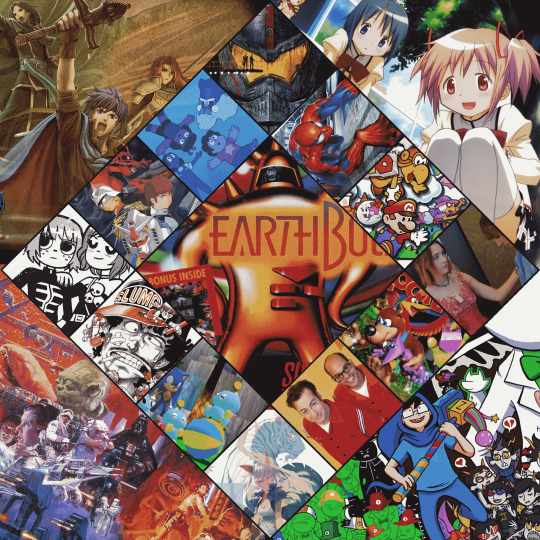
What's yours (template)
#media influences#homestuck#star wars#fire emblem#madoka magica#scott pilgrim#gundam#steven universe#pacific rim#ultimate spider man#paper mario#lady bird#banjo kazooie#mr show#monogatari#sonic adventure 2#akira toriyama#earthbound
19 notes
·
View notes
Text
The trouble with the rise of the YouTube Video Essayist™ is that everybody wants to be the next Defunctland or Hbomberguy, but all the wannabes know is how to be an influencer, so the resulting video essays are always really about themselves. You'll get a forty-five-minute video with maybe fifteen minutes of actual, topical information padded out with half an hour of tedious theatrics about how hard it was to do research for the video and how nobody wanted to talk to them, and I'm just sitting here like "yeah, dude, it was hard because you don't know how to perform research, and nobody wanted to talk to you because your behaviour toward your prospective sources amounted to borderline harassment, and that's how it looks in your own version of events which has clearly been spun for optics – I can't even imagine how badly you must have gone about this in reality".
16K notes
·
View notes
Text
Block and divest from celebrities and influencers -the one's who make millions/billions and continue to remain willfully ignorant and silent about genocide. This newest 'strategy,' for folks who have the time to do so online -please do.
#free palestine#palestine#free gaza#celebrity culture#feminist#influencer#social media#block out#block celebrities#block influencers#tiktok#tiktok video#video#abolish capitalism#fuck capitalism#capitalism kills
4K notes
·
View notes
Text

The Influencer: Social Media
2K notes
·
View notes
Text
Yeah sure everyone’s finally talking about Goncharov but it’s really disheartening to see everyone ignoring that it had been considered lost media till 2006 due to the actual mafia tracking the distribution to make sure almost every reel got destroyed. Please consider looking into the absolutely batshit history behind that, and then tell me that’s not just as interesting as the actual cyclical ending of the film!
#also not to be That Guy but try and tell me that this could even be such a classic if it hadn't been lost media for so long#luglio wishes he had that influence over the US postal system#goncharov
17K notes
·
View notes
Text
theyre trying to dehydrate our beautiful bears and make them have a six pack.... i feel sick.
#DONT GIVE IN TO COMMERCIAL CULTURE. YOU DONT NEED A DIET. BEING FAT IS HOT AND SEXY AND THEYRE CAPITALIZING OFF YOUR INSECURITY.#dont let comic book artists and oscar movies and toxic social media influencers win....#be fat and happy and draw fat and happy characters today...#ransom note
2K notes
·
View notes
Text
I think so much of the outlook over fandom would change if many people treated it like it is: a goddamn hobby.
A fandom group is no better nor more revolutionary than a knitting club. It can replicate any real world biases and discriminations and it can also be used to raise money/group people towards causes. It can foster connections that will turn to actual real political action or it can just be a gathering of people who don't know much about each other outside of it.
It can be lovely to experience when you're surrounded by a lovely group and it can be hell when the group is full of cattiness and pettiness . It can be inclusive or it can be exclusive when you're surrounded by bigotry.
Because it's a group of people - it's going to have problems. And when there's a conflict or people are pointing shit out, it needs to be solved so its members aren't spit out in the sake of "avoiding drama". Because it's a group of people, it's not automatically changing the world in a blaze of self grandeur. Because it's a group of people with a common hobby, it can impact its members lives for the better and give them a space to express themselves.
Fandom is a goddamn knitting club. It's not this inherent great, subversive force of good nor this den of evil that's traumatisizing the children. Chill out.
#babbling babbling#its true that fandom has been persecuted by many authors!!!! its true that it plays a bit on the line between copyright and mainstream#its true that it can be lovely and influence media for the better#but at the end of the day#its still a knitting club#it was after all a group of women passing thru star trek fanzines wasnt it
16K notes
·
View notes
Text
poor (y/n) 💔 she was just trying to be a good hostess 😭

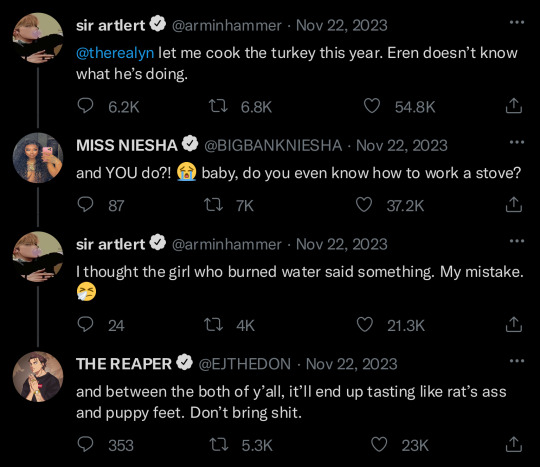
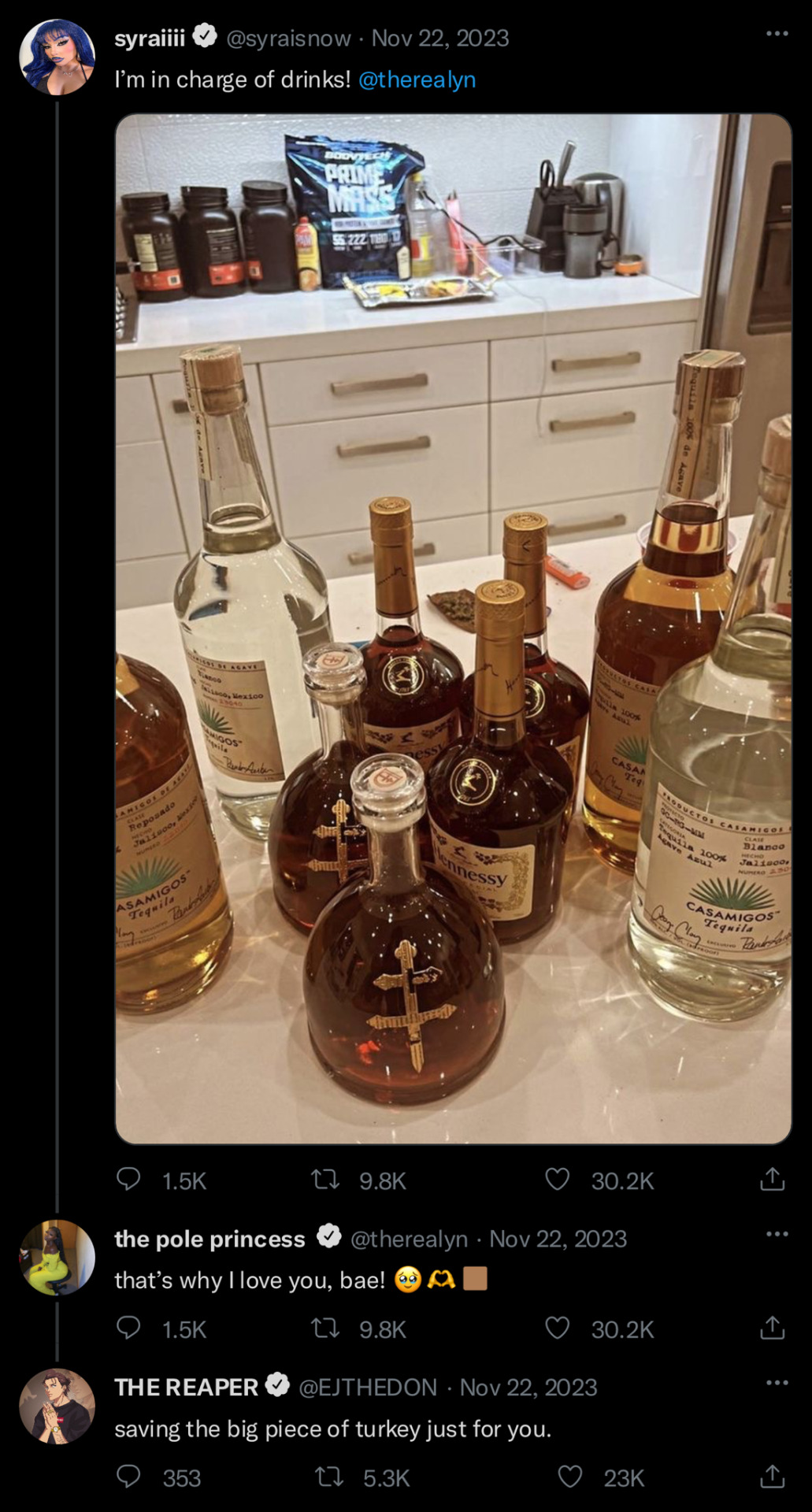


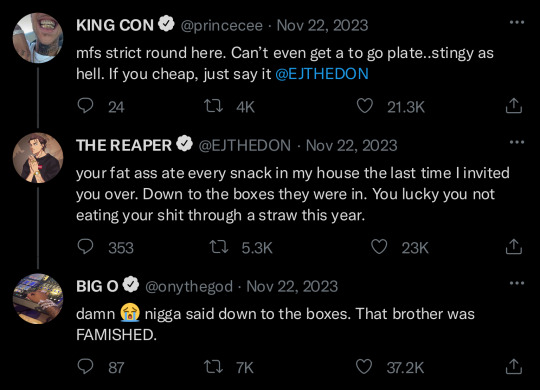

#aot x black reader#musician x influencer au#eren x black fem!reader#aot au#smau#aot smau#EJ said they better come correct or not at all#cause he not in the mood 😭#fake tweets#fake social media#social media au#connie springer#mikasa ackerman#armin arlert#sasha braus#aot onyankopon#jean kirschstein#aot ocs#black fem reader#aot fanfiction#fake post#black fanfiction#cw violence#cw guns#cw food#black reader#aot#snk smau
885 notes
·
View notes
Text
Publishing has always been a fucking nightmare, but now it’s a layer of hell. It’s not enough that writers be good at what they do. Writers have to maintain an active social media presence and cultivate a following. Be available.
They have to be conventionally attractive enough to look good enough to see on a screen, aesthetically pleasing, kind, funny, up-to-date on trends, socially aware but not so controversial that they turn off a brand from California from slapping their discount code on a video promoting a book.
They have to do all of this with no media training, with little help from the companies that are supposed to be doing this for them.
Of course, a lot of this isn't possible for say, the 40-something mother of two who teaches English at a school and writes on the side. She’s boxed out of an already complex industry that already has enough walls.
On some level, I think authors have always marketed themselves a little, but we’ve reached such a crazy point where we’re demanding the author become the influencer. Accessibility in publishing has narrowed from an inch to a sliver. And that inch was hard enough to get in as is.
#This is about traditional publishing but there’s pretty privilege and ageism in self publishing too#I can’t think of the last time I saw an up and coming author recording videos who was over thirty#And frankly that’s a shame#It could be that I’m not looking hard enough#but it’s more likely that algorithms are trained the way they are#truly I don’t think they should have to do any of that at all#And forgive me but (and I know it’s rich because I’m an artist on a platform) but art shouldn’t be at the mercy of an algorithm#Now there’s also something to be said about self publishing becoming easier and easier to achieve success in#And doors opening because of influencer status is real and makes publishing wider in a way#But that doesn’t mean it’s accessible#I’m not gonna plaster my health issues over the wall but that life is certainly not accessible to me!#are you healthy enough to write and make sure people on social media still want to like your stuff#are you mentally well enough to be your own pr#I’m sure people who have studied this have more to say and have said it better but this is what I’ve observed#writing#publishing#publishing industry
752 notes
·
View notes
Text
Article by Fortesa Latifi:
"Being the child of an influencer, Vanessa tells me, was the equivalent of having a full-time job—and then some. She remembers late nights in which the family recorded and rerecorded videos until her mother considered them perfect and days when creating content for the blog stretched into her homeschooling time. If she expressed her unease, she was told the family needed her. “It was like after this next campaign, maybe we could have more time to relax. And then it would never happen,” she says. She was around 10 years old when she realized her life was different from that of other children. When she went to other kids’ houses, she was surprised by how they lived. “I felt strange that they didn’t have to work on social media or blog posts, or constantly pose for pictures or videos,” she says. “I realized they didn’t have to worry about their family's financial situation or contribute to it.”
Vanessa, who requested anonymity to speak freely about her family dynamics, says she helped create content for huge companies like Huggies and Hasbro when her mom landed endorsement deals. When she reached puberty and began menstruating, her mother had her do sponsored posts for sanitary pads. “It was so mortifying,” she says. “I just felt like I wanted to crawl into a hole and never come out.”
Being part of an influencer family changed everything about her life, Vanessa says. “Sometimes I didn’t know where the separation was between what was real and what was curated for social media.” And her mother’s online presence indelibly warped their relationship. “Being an influencer kid turned my relationship with my mom into more of an employer-employee relationship than a parent-child one,” she says. “Once you cross the line from being family to being coworkers, you can’t really go back.”
...
Khanbalinov has had zero new offers since he took his kids offline. “When we were showing our kids, brands were rolling in left and right—clothing companies, apps, paper towel companies, food brands. They all wanted us to work with them,” he says. “Once we stopped, we reached out to the brands we had lined up and 99 percent of them dropped out because they wanted kids to showcase their products. And I fought back, like, you guys are a paper towel company—why do you need a kid selling your stuff?”
The law has woefully lagged behind the culture here, but there’s signs that policymakers might finally be catching up. In 2023, in addition to Illinois, three other states—New York, Washington State, and New Jersey—proposed bills to protect influencer kids. Contrast that with the flurry of legislative activity in just the first two months of 2024. Seven more states—Maryland, Georgia, Ohio, Missouri, California, Arizona, Minnesota—have introduced similar legislation. Some of the bills are going one step further to protect the privacy of the kids featured in this content. In some states, proposed legislation would include a clause that borrows from a European legal doctrine known as the “right to be forgotten”—it would allow someone who was featured in content when they were a child to request that platforms permanently delete those posts. None of the current legislation introduced, however, would outright bar the practice of featuring minors in monetized content.
...
The movement on this issue was glacial for years, but it finally feels like the ice has thawed. Much of that progress is thanks to activists like Cam Barrett (she/they), a 25-year-old creator (@softscorpio) who uses TikTok to talk about her experience of being overshared in their childhood and adolescence. Barrett doesn’t go by her legal name anymore because of the online history it’s tied to. “I love my legal name,” Barrett tells me. “I just don’t love the digital footprint attached to it.” Last year, Barrett testified in front of the Washington State legislature as a proponent of a bill to protect influencer kids. This year, they testified again—this time, in front of the Maryland legislature.
“As a former content kid myself, I know what it’s like to grow up with a digital footprint I never asked for,” Barrett told the Maryland House of Delegates Economic Matters Committee in February. “As my mom posted to the world my first-ever menstrual cycle, as she posted to the world the intimate details about me being adopted, her platform grew and I had no say in what was posted.” And yet, Cam says her activism has been healing.
For Cam and other influencer children, getting a paycheck won’t give them back what they lost—a normal childhood unobstructed by the cameras pushed into their faces. But it could be the beginning of some version of restitution. “My friends say I’m fighting for little Cam,” she tells me. “It feels very healing because I didn’t have anyone to fight for me as a kid.”"
Read the full article here: https://www.cosmopolitan.com/lifestyle/a60125272/sharenting-parenting-influencer-cost-children/
412 notes
·
View notes
Text
I don't know how, but for bills like KOSA and related to be opposed, i think there should be a *huge* uproar against them. I feel it should have a bigger reach than the one there already is, which is quite big at the moment.
Remember what happened around 12 years ago with the SOPA bill and serveral websites expressing their opposition to the these bills, the protests and how it left the SOPA bill dead? I think there should be something similar, if it is possible.
#kosa bill#stop kosa#lgbt#If only there was a way to get youtubers or people with bigger influence in social media involved mmm
348 notes
·
View notes
Text
The problem with Victor Frankenstein isn't that he's not as smart as he thinks he is. The problem with Victor Frankenstein is that he's exactly as smart as he thinks he is in one very specific area, and he just expects that to automatically translate to every other area of his life and is taken completely by surprise every single time it doesn't.
#media#literature#frankenstein#victor frankenstein#mary shelley#characterisation#he's the forefather of every stem influencer who thinks having a phd in physics automatically makes them a qualified sociologist
10K notes
·
View notes
Text
i'd like everyone to notice that her career is still intact after speaking up for palestine. nicola coughlan's career is still intact. bella hadid, zayn malik, louis tomlinson, jenna ortega, avantika, renee rapp, dylan o'brien, melanie martinez, florence pugh, the weeknd, chappell roan, etc, are all still relevant. don't let these celebrities or influencers convince you that they can't do anything!
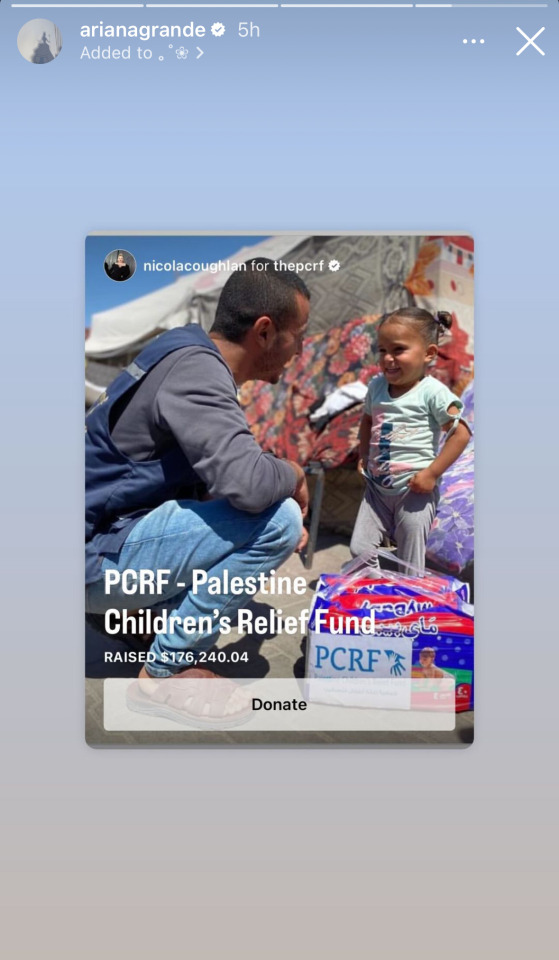
#free palestine#and don't let influencers convince you that they're not 'educated enough' to speak up when their whole job relies on social media#it's so easy to spend some time to research an issue and you don't have to be 'qualified' to speak on it
260 notes
·
View notes
Text
Being the child of an influencer, Vanessa tells me, was the equivalent of having a full-time job—and then some. She remembers late nights in which the family recorded and rerecorded videos until her mother considered them perfect and days when creating content for the blog stretched into her homeschooling time. If she expressed her unease, she was told the family needed her. “It was like after this next campaign, maybe we could have more time to relax. And then it would never happen,” she says. She was around 10 years old when she realized her life was different from that of other children. When she went to other kids’ houses, she was surprised by how they lived. “I felt strange that they didn’t have to work on social media or blog posts, or constantly pose for pictures or videos,” she says. “I realized they didn’t have to worry about their family's financial situation or contribute to it.”
Vanessa, who requested anonymity to speak freely about her family dynamics, says she helped create content for huge companies like Huggies and Hasbro when her mom landed endorsement deals. When she reached puberty and began menstruating, her mother had her do sponsored posts for sanitary pads. “It was so mortifying,” she says. “I just felt like I wanted to crawl into a hole and never come out.”
Being part of an influencer family changed everything about her life, Vanessa says. “Sometimes I didn’t know where the separation was between what was real and what was curated for social media.” And her mother’s online presence indelibly warped their relationship. “Being an influencer kid turned my relationship with my mom into more of an employer-employee relationship than a parent-child one,” she says. “Once you cross the line from being family to being coworkers, you can’t really go back.”
Vanessa will never get back the childhood that she gave up for the family business—not getting any of the money she helped earn is just another disappointment, even if it was entirely unsurprising. “My mom never led me to think there would be anything. She would continually remind me that the money she was getting from the blog or sponsorships was going toward us anyway through basic needs and that should be enough.”
330 notes
·
View notes
Text
And you know that there are many journalists who are very concerned about the pressure that's being applied about the sensitivities of this conflict.
And let's just be very clear here. We have the Israeli government, has a lot of supporters in Congress, has a lot of supporters in the media, has a lot of supporters in activist groups on K Street. There is a, quote unquote, pro-Israel lobby which does apply pressure on media organizations.
If you've worked like I have, both in American media and British media, you've seen the emails from honestreporting .com, and Kamera. And some of these groups your listeners may never have heard of. But I'll tell you what, every newsroom has heard of these groups; “Why is your headline this,” and “Why is your reporter showing bias?”And, “Why do they tweet this?” In this recent case, it's Louisa Lovelock, who is a British journalist at the Washington Post. It's a fantastic Middle East correspondence. Covered Syria, covered Iraq, covered Gaza, covered a bunch of things.
It's so absurd, the dossier they've produced against her. One of the things they go after is she took part in student protests at university in England against tuition fees. And..? A) that's a bad thing? B) that means she can't cover Israel's bombing of Gaza? It's so absurd. The stuff that they pull with me. Of course, I've had stuff going back 20 or 30 years that they've thrown at me. And it's a real problem where people get intimidated into not saying, not speaking what they want to speak about.
And we live in a world where the right is obsessed about cancel culture and free speech when, let's be very clear, the greatest victims of, quote unquote, cancel culture in this country have always been Palestinian activists, both on campus, in the media, and in politics.
I mean, let's just be clear, we have a Congress filled with white supremacists. We have a guy, I think, Andy Ogles from Tennessee, this week who was caught on tape saying, “Kill them all.” Alright? None of these guys get any attention. No votes of censure. Who is the only member of Congress who's been censured since October the 7th? The one Palestinian woman.
So let's just be very clear who the victims of, quote unquote, cancel culture and suppression and intimidation are. It tends to be people who speak out on behalf of Palestinians. And that's the case with reporters who aren't even taking positions. They're just reporting what they're seeing, and what they're seeing of course, is not favorable to the Israeli narrative, because what they're seeing is mass starvation. What they're seeing are mass killings. What they're seeing are kids being pulled out from the rubble. And, of course, that doesn't help the Israeli narratives.
—Mehdi Hasan, on ‘cancel culture’ and how journalists and reporters are attacked for simply reporting the truth about Gaza 🇵🇸
#politics#mehdi hasan#gaza#rafah#israel#hasbara#aipac#cancel culture#all eyes on rafah#ethnic cleansing#genocide#war crimes#accountability culture#media bias#media influence
278 notes
·
View notes